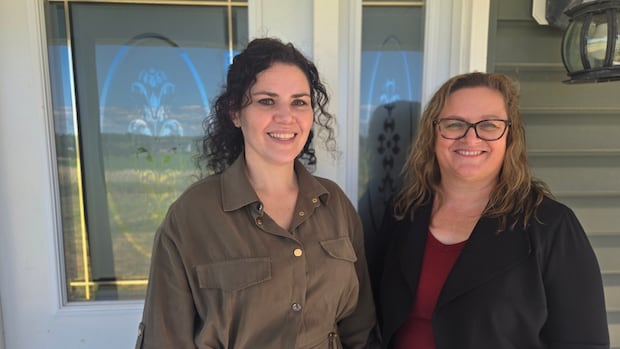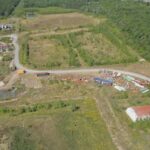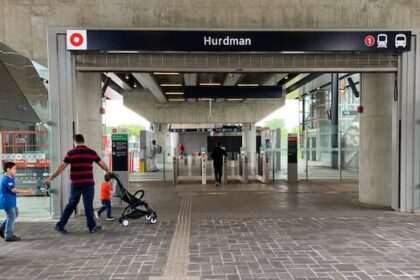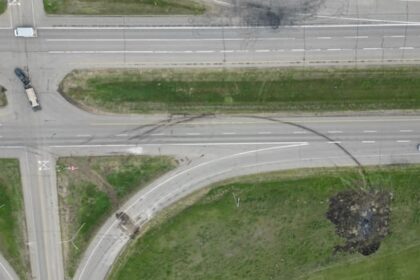A grey apartment building in greater Miramichi looks like any other on the outside.A sprawling living space greets those who enter, and a wall next to the staircase holds seven picture frames with “steps” written in each: the first, describing the struggle of inner change.While it sits empty now, the Elizabeth Fry New Brunswick building will welcome its first six tenants this fall — all formerly incarcerated women who are pursuing an education in the trades.”Busy and chaotic, and all of the feelings. I hope to see every human feeling being felt,” housing director Christine Wark said, describing her hopes for the space once residents arrive.WATCH | Finding an alternative to the ‘vicious cycle’ of reoffending: Housing and education program helps women released from prison build a new life A new Elizabeth Fry New Brunswick project in the Miramichi area will house formerly incarcerated women while they complete education in the trades. “I’m hoping when I come to visit … that I can hear them outside, in happy ways and good ways. I expect to hear of frustrations and anger, and all of those things. It’s going to be a gamut, and I’m excited for all of that.”Support workers will be on site 24 hours a day, seven days a week, to help residents with everything from cooking meals to navigating emotional distress. The project, called My Way, was inspired by former inmate Sara Tessier, who found access to stable housing and education were critical to success after prison.There are seven frames next to the staircase, each holding a ‘step.’ (Submitted: Elizabeth Fry New Brunswick)”If a judge sentences someone to five years, well, really they’re being sentenced for life,” Tessier said in an interview. “And the reason I say that is, now this criminal record is preventing them from getting jobs, getting housing. You know, their basic needs.”Tessier now works for the Northpine Foundation, a charity group that invests in projects meant to serve communities most at risk of poverty.The charity gave Elizabeth Fry New Brunswick $2 million to fund My Way’s startup costs and its first two years in operation. The project was inspired by Sara Tessier, a former inmate who found success post-release with access to education. (Submitted by Sara Tessier)Tessier sees it as an opportunity to show that former inmates can be a valuable part of their community with the right support in place. “I come from a very traumatic background, you know, sexual abuse and sex trafficked … I didn’t really have supports,” Tessier said. “I have firsthand experience of what the needs are, what the gaps are in the current resources and supports and also … some solutions that would work a lot better than what’s currently in place.”‘They have nothing’Elizabeth Clark, executive director at Elizabeth Fry New Brunswick, says there are currently huge gaps for those leaving a prison or jail.”Somebody coming out of incarceration typically or oftentimes will come into a situation where they have nothing — no income, nowhere to go, no supports,” Clark said. “Coming out of … a prison facing that much adversity sets people up to fail.”Wark said that can lead to a cycle of reoffending.The organization plans to have residents plant and harvest their own food in a garden to be added to the site. (Victoria Walton/CBC)”When people get released, if they’re looking at homelessness, if they’re looking at precarious housing because of the interruption in their housing because of the incarceration, we’re looking at job loss, they’re looking at family loss, looking at all these things,” Wark said. “That’s a lot of desperation that starts to happen. Like that’s a lot of loss for one person to endure.”Recidivism, or repeat offending, comes at a cost for the individual and the province, Clark said.”It’s cheaper to provide people with an opportunity than to pay for them to be incarcerated. The cost of keeping somebody in prison is staggering,” Clark said.The project looks to provide stable housing, but also teach residents living skills like meal planning and preparation. (Victoria Walton/CBC)”If you don’t provide opportunity for them upon their release, then the costs just get amplified over the lifespan of this person. The costs to the legal system, the cost of the medical system that is already overloaded … the social costs, you know, the personal harm that occurs to people, the trauma that’s experienced.” The Department of Public Safety said in April its latest cost figure for housing an inmate in jail was for 2022 to 2023, coming in at $88,300. That grew from the last publicly shared figure, $66,000, in 2018.Public Safety Minister Robert Gauvin declined an interview, but said by statement he’s aware that former inmates can face housing insecurity. Bedrooms are meant to give residents some privacy, with a locked door and mini fridge. (Victoria Walton/CBC)”While we do not have a policy that prioritizes individuals for housing simply because they have been incarcerated, we are working to improve the support available to them,” he said. “One recent improvement allows clients to schedule appointments with Social Development up to 30 days prior to their release. This ensures individuals can meet with staff shortly after returning to the community, reducing delays and supporting better outcomes.”Gauvin said that in the past long wait times for those intake appointments “increased the risk of recontact with the justice system.”A road to employmentThe New Brunswick Community College adjusted its introduction to trades program to provide a course specifically for the women housed with Elizabeth Fry New Brunswick.The college did not respond to requests for comment.Clark said the women who graduate from the course, which introduces them to electrical, plumbing and carpentry, will be able to go directly into an apprenticeship or pursue further education. Several mental health resources are available to residents of the building. (Victoria Walton/CBC)Trades are typically male-dominated fields, but Clark said they also tend to be more accessible after incarceration.”It’s tougher for women coming out of incarceration than it is for men in that way, because many occupations that are traditionally female occupations are more difficult if you have a criminal record,” Clark said. “Imagine childcare, education, things like that.”While the program now has funding for two years, Clark said the plan is to keep it running permanently — and even open more, if the model proves to be successful.Residents will plan and prepare meals together in the large kitchen and dining space. (Victoria Walton/CBC)”There’s a huge need for people in trades. There’s a lack of housing that is going to be overwhelming for us very soon, as we see an increased need for houses to be built,” Clark said. “Having more people in trades is good for everyone. It’s good for our participants, it’s good for the economy, it’s good for us.”
Housing project looks to keep former inmates in the classroom and out of jail











